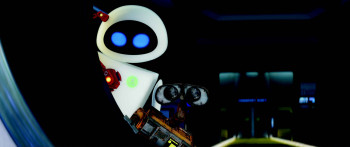WALL•E
 A few caveats at the outset: Bad Dog Ginger was causing disruptions resulting from her intense interest in a cat at the drive-in, and five-month-old Emily was causing disruptions because her normal sleep schedule was itself disrupted. So I did not have the opportunity to concentrate fully on Pixar’s WALL•E.
A few caveats at the outset: Bad Dog Ginger was causing disruptions resulting from her intense interest in a cat at the drive-in, and five-month-old Emily was causing disruptions because her normal sleep schedule was itself disrupted. So I did not have the opportunity to concentrate fully on Pixar’s WALL•E.
But I doubt that my attention would have been rewarded. Once the movie zooms to a bustling cruise (space)ship, WALL•E is fine, but it felt like Monsters, Inc. 2 – manic and bright and silly. Consumerism has turned humans into blobs! The captain must defeat a stubborn, HAL-like robot! Watch a fleshy fat-people pile-up!
I won’t fault Pixar for turning an earnest concern about consumerism and waste into a merchandising extravaganza, but the movie itself feels like it was plotted in a committee dominated by folks on the business side of things, afraid of a movie for kids with no people and no real dialogue.
Their concession to the “artists” was the opening, and it’s a huge tease, heavy with the promise of transcendence. This beautifully rendered, largely people- and word-free section is stunningly good, as the refuse-compacting robot WALL•E tries to clean up the Earth after our consumer detritus has literally overwhelmed the planet. He meets the probe robot EVE, and their early interactions are fascinating. These things are anthropomorphized just enough that they seem alive – EVE’s eyes are amazingly expressive – yet they are still fundamentally robots. WALL•E collects specimens that interest him, but he can’t figure out whether to put a spork in the fork pile or the spoon pile; it does not compute. The lethal EVE has a directive that overrides all other impulses. These are engaging characters because they’re not human.
The beginning of WALL•E features visual storytelling at its finest, and aspiring screenwriters should study it for the ways it conveys information without verbal exposition.
They should also study it for tone, because while there’s a post-apocalyptic bleakness, it’s balanced by humor, the title character’s curiosity, and his budding relationship with EVE. The obvious environmental aspect of the movie is a secondary element to its story and its characters.
Once the adventure plot kicks in, though, WALL•E becomes sadly conventional in just about every way. Like Saving Private Ryan – and don’t tell me you saw that comparison coming – a stunning start carries the remainder of the movie.
With a production budget of $180 million, I certainly understand the hesitation in having WALL•E follow the path that its first reel lays out. That’s a lot of dough to spend on something so dark that could easily be the modern equivalent of a silent film – with the only speech coming from Fred Willard, who would haunt my otherwise human-less movie with his abundant false cheer.
But I don’t think stripping the humans from the movie would have required the story to be fundamentally different. The core narrative could have still involved a return to the cruise ship (devoid of humans), with the conflict stemming from contradictory directives – the earlier one demanding a return to Earth, and the later one abandoning any hope that the planet could be saved. The fact that these orders are pointless would make them both comical and sad.
But would the movie be too grim? Nah. The human subplot of WALL•E is by far its most cynical element, and it seems worse for being played for laughs. And the ending – in which a can-do attitude has to be considered against the almost certain futility of a human return to Earth after the discovery of a single plant – would play much better. These robots represent a higher purpose that they don’t understand, just as we humans yearn from something larger than ourselves. It’s sweet and touching and a little bit pathetic, doing work for a race that no longer exists. Yes, they’re robots, so they don’t really have a choice, but there’s a hint of free will, and the job is important enough that it must be done.
Alas, we have only WALL•E.
I pretty much adored everything Pixar did through The Incredibles, but its last three offerings have been problematic. Cars was strictly for kids. And while I appreciated and admired almost every aspect of Ratatouille, any pleasure I derived from it was fleeting; it was, in its way, perfect, but I didn’t sense the typical Pixar joy in its creation. It was safe.
There is joy and inspiration and danger in WALL•E … for a little while. Then the people show up and ruin the party.

